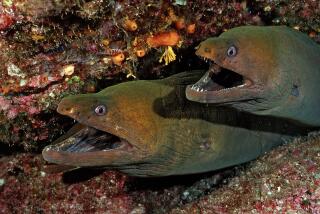18-foot oarfish found off Catalina Island
- Share via
Staff at a marine institute are trying to figure out what to do with the carcass of an 18-foot-long sea creature discovered off the coast of Catalina Island.
Marine science instructor Jasmine Santana was shocked to confront the rare oarfish Sunday in the waters of Toyon Bay, about two miles from Avalon and 22 miles off the Port of Los Angeles.
It was the “discovery of a lifetime,” according to a news release from the Catalina Island Marine Institute, where Santana works.
The snake-like fish was found late Sunday afternoon dead but nearly intact, according to the release, adding it appeared to have died from natural causes.
“It took 15 or 20 of us to pick it up,” said Jeff Chace, a program director with CIMI, which runs a camp at Toyon Bay that teaches children to snorkel, kayak and hike, according to KTLA-TV.
Instructors from CIMI were unloading gear from a trip to Santa Barbara Island when they spotted Santana pulling the oarfish ashore.
“The craziest thing we saw during our two-day journey at sea happened when we got home,” instructor Connor Gallagher said in the news release.
The oarfish, which can grow to more than 50 feet, is a deep-water pelagic fish — the longest bony fish in the world, Chace said. It’s rare to see one so close to shore, he said.
“It’s one of these rare, weird things you see in Southern California,” Chace said.
CIMI is trying to figure out what to do with the silvery fish’s body. The program has been in touch with UC Santa Barbara and the Museum of Natural History in Los Angeles, Chace said, according to the TV station.
“We can’t even really fit it into our freezer,” he said.
The scientists may decide to bury the carcass and let it decompose under the sand.
ALSO:
BART strike possible Tuesday as talks continue
Accused terror figure ‘never supported Al Qaeda,’ brother says
Sister recalls horrible scene as Long Beach teacher is slain at park
More to Read
Sign up for Essential California
The most important California stories and recommendations in your inbox every morning.
You may occasionally receive promotional content from the Los Angeles Times.










